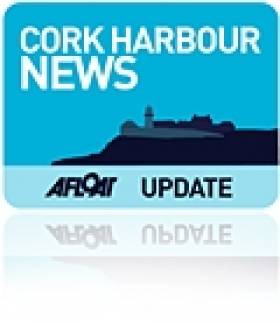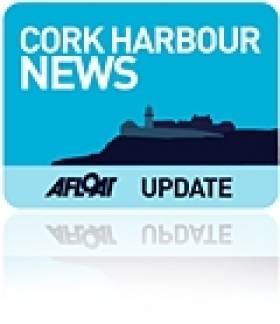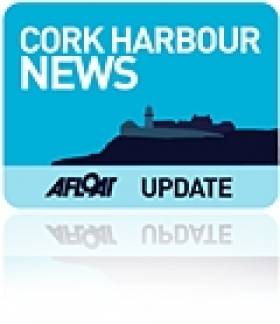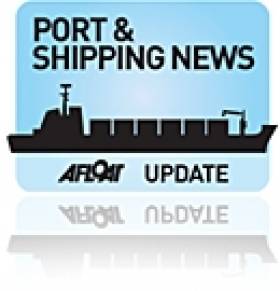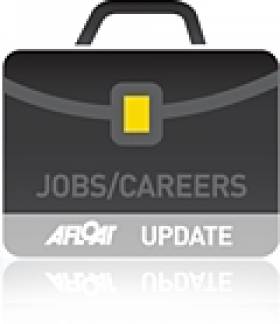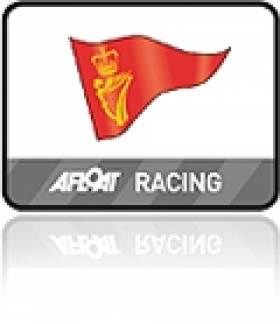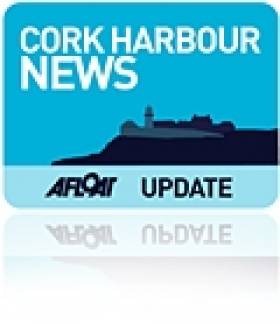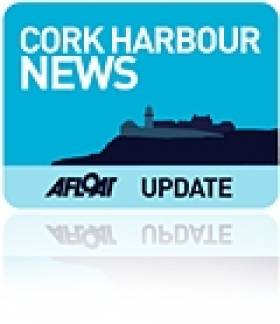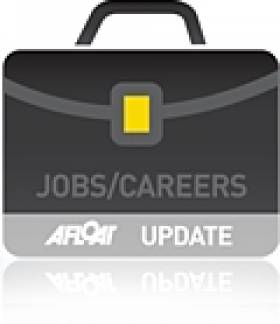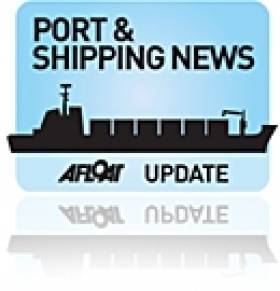Displaying items by tag: Cork Harbour
Spike Island Revisited
It's unclear how Spike Island, now a tourism and heritage site, will be marketed says Mary Morrissy in today's Irish Times HERE
Cove SC Prepares for SCORA Championships
Cork Harbour Town Welcomes Over One Million Visitors
Minister for Enterprise, Trade and Innovation Batt O'Keefe TD told Cobh and Harbour Chamber of Commerce last week that over one million visitors had come to Cobh in the past year and how the famous port had played a vital part in tourism for Cork harbour. Cobh is the deepwater port for visiting cruise liners and a centre of excellence for angling holidays. More from Cobh Edition HERE.
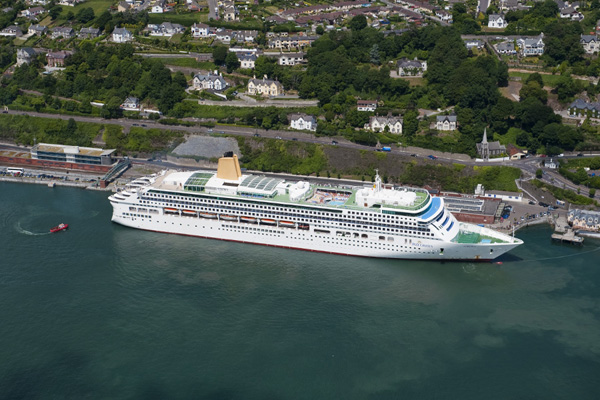
Fastnet Line Exceed Expectations
Fastnet Line recorded carrying over 60,000 passengers up to the end of August since the Cork-Swansea route re-opened in March, served by the 21,699 tonnes M.V. Julia, writes Jehan Ashmore.
Commenting on the inaugural season, Paul O'Brien, general manager of Fastnet Line said figures were ahead in June, July and August by an average of 10%. Over 13,000 passengers were carried during July and 15,000 in August on the 10-hour service.
Businesses in the south-west region have reported increased tourism activity and is it from here and in south Wales that many of the shareholders have invested to form the West Cork Tourism Co-operative, which runs Fastnet Line. In 2006, the previous operator of the route, Swansea-Cork Ferries closed the service after selling their vessel, the Superferry to interests abroad.
Marketshare between Ireland and UK passengers appears to be evenly split with the tourist gateway to south-west Ireland proving particularly
popular with Londoners reaching Swansea using the M4 motorway. Motorists can save over 600km /370 miles on the direct round trip compared to alternative ferry routes between Rosslare and Pembrokeshire ports.
During the first two months of operation, booking revenues were in excess of £3m (sterling) alone, with over 15,000 passengers using the 1,860 capacity and freight-ferry, Julia. Unsurprisingly there was a 100% boost in April bookings arising from travel disruption caused by the Icelandic volvanic ash-cloud.
The year-round overnight service operated eight sailings weekly in the high season and is now down to six. Notably there are no Monday sailings as Julia spends a lay-over period at the Ringaskiddy ferry terminal in Cork.
The freight market will continue to be important factor during the offseason with the British Bermuda flagged Julia capable of loading 40 trucks or trailers. As for passengers, Fastnet are promoting short-break and mini-cruise offers only on sailings up to December 21st.
Ship Based Training Launched
The National Research Ship-time Training Programme today (7th September 2010) announced the launch of the autumn Science@Sea ship-based training courses for undergraduate and postgraduate students studying marine science.
The two-day training courses are to be held between the 18th and 21st of November 2010 and offer students an opportunity to work aboard the national research vessel RV Celtic Voyager, gaining practical experience in marine research in the waters off Cork.
"Students will work with scientists and technicians while on board, allowing them to develop a multidisciplinary approach towards marine science, focussed on integrating the core disciplines of oceanography, marine geophysics, benthic ecology and fisheries biology," said Dr. Paula McGrane, coordinator of National Research Ship-time Training Programme. "Other areas addressed will include the practicalities of survey design and planning, research vessel operations and capabilities and safety at sea".
"Science@Sea courses have been running since spring of 2008 and are recognized by the Institute of Marine Engineering, Science and Technology (IMarEST) as a means of contributing towards a student's professional development and career," she added.
The course dates are as follows: ·
Postgraduate Course: 18th -19th November (Thursday & Friday) ·
Undergraduate Course: 20th -21st November (Saturday & Sunday)
Application forms and further information about the programme can be found on www.marine.ie or by e-mailing [email protected]
Laser Training Starts at Royal Cork
Following a detailed briefing on the Club's Autumn and Winter schedule, Thomas Chaix outlined the Irish Sailing Association programme for the coming year. This includes club, regional and academy training options available designed to prepare the fleet for the first major of next year - the Munsters in Baltimore at Easter.
Hundreds Gathered for Cork Harbour Open Day
Cork Harbour Open Day proved to be a great success with hundreds of people enjoying the harbour and the free family events on offer. Throughout the day, the LE Aoife at Horgan's Quay welcomed families and children on board where they were given a tour of the ship and an insight into Navy life. The sailing race from Cobh to Blackrock, sponsored by the Port of Cork, was a huge success with over 50 boats taking part. Blackrock Castle opened the tower to the public and was busy throughout the day with people using the tower to watch the boats sail through the finish line at Blackrock.
Camden Fort in Crosshaven attracted hundreds of visitors to see the newly restored rooms and to learn more about the 'Rescue Camden' project. Also in Crosshaven the Coastal Rowing Association organised their end of season championship regatta where Passage West won all eleven races and the RNLI Station opened to the public.
'Dreamer' the fastest rigid inflatable boat (RIB) round Ireland was at the Port of Cork Marina for all to see. Built locally by Gale Force Ventures in Carrigaline and owned by current round Ireland record holder, Phillip Fitzgibbon from Co. Kerry, the 10 metre RIB can reach a speed of 65 knots.
Further events such as the World Rescue Challenge on North Custom House Quay, attracted large crowds over the whole weekend and in Cobh, the 'See You in Cobh' committee organised a crab fishing event on the promenade with over 80 children taking part.
One of the organisers of Cork Harbour Open day, Sara Dymond was thrilled with the day saying: 'The sun shone in Cork Harbour on Saturday and showed the harbour in all its glory. Cork Harbour Open Day aims to raise awareness of the different activities available for people in the harbour both on and off the water and this year we saw an exceptional turnout of people of all ages. There are endless activities to do in the Harbour and this year proved how popular the harbour is and how much people enjoy it. We hope to expand on this for next year.'
She continued: 'Thank you to all those who arranged events and helped out on the day.'
The idea for a Harbour Open Day emerged from discussions between various stakeholders involved in the development and implementation of the Integrated Strategy for the Harbour. A group comprising representatives from UCC, City and County Councils and the Port of Cork set about working together to engage users of the Harbour and to organise the Open Day.
Images from Bob Bateman on the Afloat Gallery HERE
Cobh to Blackrock Race was Scorching Success
The racing was started from the beautiful Ketch Soubrette from the Naval Service Yacht Squadron Cove S.C. First off were the slow dinghies and the white sail and classic yachts and these presented no problem to the Race Officer. However, when it came to the turn of the cruisers, with a strong flood tide they charged the line, and a general recall ensued. The Race Officer then proceeded to start the J80s before having another attempt at the cruisers Zero to Class Four. This time a Z flag was flown and anyone over the line in the final minute would have a 20% penalty applied. Happily, all went well on this occasion with a clean start and although the breeze was light and flukey all boats managed to make the finish at Blackrock Castle before the time limit. The finishing boat was a former Aran Class Lifeboat, the Samuel J and the first boat to reach the line was Jim Sheerin of Royal Cork Yacht Club in his Catamaran, narrowly beating Eddie English in the Holy Grounder from Sail Cork. In days gone by Eddie used always be first to the finish line in his yellow Hobie. Happy memories!
The event played a big part in the Port of Cork Open Day and for the first time the race had the benefit of the Port of Cork City Marina. When the boats had completed the race at Blackrock Castle they proceeded right up to the city for the prize giving and other festivities planned. All the local towns and villages in and around Cork had events planned for the Open Day and what a difference to last year when the event was completely washed out.
What a coup for Cove Sailing Club with the wonderful reinvigoration of this much loved event. One of the nice things about this is that young children were to be seen sailing with their parents and being given the opportunity to helm all types of craft from Catamarans to Cruisers. It was that kind of event and a wonderful way to get youngsters interested in sailing and fostering a love of the sport.
Photos of the event on the Afloat Gallery HERE
National Maritime College Publishes New Video
The National Maritime College of Ireland in Ringaskiddy has published a new promotional video highlighting job opportunities from studying at its state of the art marine facilities in Cork harbour. See the video below.
Government Begins Review of Irish Ports
Minister for Transport Noel Dempsey T.D. today announced the launch of a national ports policy review with the publication of a consultation document.
There are ten State commercial port companies established and operating pursuant to the terms of the Harbours Acts 1996 - 2009; Cork, Drogheda, Dublin, Dundalk, Dún Laoghaire, Galway, New Ross, Shannon Foynes, Waterford and Wicklow.
It is estimated that approximately 99% by volume of all goods traded into and out of Ireland are handled at our ports. Dublin Port is the State's biggest port handling approximately 44% of all tonnage in 2009. Cork and Shannon Foynes were the second and third biggest ports respectively in 2009.
Today's consultation document provides stakeholders with an opportunity to help shape future ports policy.
Speaking today Minister Dempsey said; "In 2005 our national Ports Policy Statement outlined national ports policy in a single document for the first time. Since then the commercial, technological, and regulatory environment in which Irish ports operate has changed dramatically, both domestically and globally. It is now time to carry out a review of this policy framework to ensure that our ports are properly positioned for the future.
Since 2005 our ports have experienced both record highs and more recently sharp declines in tonnage throughput. The ports face considerable challenges and it is important that national policy helps address these. The indications are that the country's return to economic growth will be export led. In this regard, it is vital that the ports are in a position to facilitate this and to make their contribution to improving national competitiveness.
I would encourage all interested parties to engage fully in this important consultation process."
The consultation document provides an overview of developments in the sector since 2005 and poses a number of questions on the continued validity and future direction of national ports policy.
Important issues addressed in the document include planning and funding future port developments, the role ports have to play in delivering the "Smarter Travel" agenda, competition within the sector and the corporate governance regime for port companies.
The public consultation period is scheduled to continue until Friday 29th October 2010.
The full Consultation Document is available for download below
To make a submission click HERE
Read Tom MacSweeney's Island Nation blog on the importance of ports HERE


























